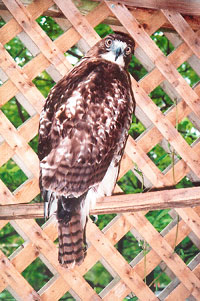Hawk has a new life as a teacher
By Bonnie Edwards
Published in News on August 11, 2005 1:47 PM
An injured red-tailed hawk that can never return to the wild has begun a new life as a teacher.
Ruger is in her second year and lives in a flight cage near Goldsboro at the home of Judy Wilt, a wildlife rehabilitator. Mrs. Wilt has been doing wildlife presentations with two other birds for public school children and 4-H groups for three years.
She recently packed up Ruger and took her to Wayne Correctional Center for her debut.

News-Argus/PHOTO SUBMITTED
Ruger, a red-tailed hawk, lives in a flight cage near Goldsboro at the home of Judy Wilt, a wildlife rehabilitator.
Ruger makes "baby sounds" when she comes out of her carrier. When she gets ready to cough up a pellet, similar to a hair ball in a cat, she makes a "tweety" sound.
Ruger's debut was a hit. One of the men asked his supervisor, "When is she coming back again?"
"I hadn't even left the building," Mrs. Wilt said.
Ruger came to Mrs. Wilt through a phone call in July 2004.
The caller said a hawk was down. Apparently, the man said, a victim of teenagers who shot it while it was in flight.
Mrs. Wilt found Ruger on Northview Drive behind Belfast School, sitting on top of a well house cover with one wing drooping at her side.
Veterinarians wrapped the wing and took X-rays. A pellet had pierced her left chest, missing major organs, but a bullet from a high-powered rifle had shattered a wing.
Surgery lasted two hours, while Mrs. Wilt held the bird's feet.
Anesthesia is sensitive for a bird. Too far under, and the bird might not wake up, Mrs. Wilt said. Too little anesthesia, however, and the frightened bird might fight back against what it perceives as an attacker.
"The first thing that moves is the feet," Mrs. Wilt said. "She did come out several times, and those feet started to go."
The vet put a pin in the wing and removed it a few months later. Safety wires were left behind to stabilize the injury.
"This will always be a weak joint," Mrs. Wilt said.
Ruger will never hunt again. She can fly from one end of her cage to another, but her wing would break again if she tried to do a steep dive, Mrs. Wilt said.
"She will be in a flight cage the rest of her life," Mrs. Wilt said. "I could release her, but she'd die."
But that doesn't mean she won't have a job to do. Mrs. Wilt made sure of that.
She knew she was going to have to acquire a special purpose possession permit if she wanted to keep Ruger.
The first two applications to the state "disappeared into the black abyss in Raleigh." She sent a third application by fax in January and called to confirm it had arrived.
She received the state permit and formally applied for a federal permit.
The federal permit arrived in February. She had stayed in contact with the federal government throughout the process with the state, because she had only 120 days to obtain the federal permit.
Federal wildlife officials want to know once a year how many times the birds have been used for educational purposes.
Mrs. Wilt has been giving education presentations to children since 2002 with two other birds of prey, a female Eastern screech owl named, Rusty, and a male American kestrel falcon named S.J. Horus.
Mrs. Wilt said she considers Ruger and the little birds teachers and teaching aids.
"When she stands there and looks you straight in the eye, she's not a dot in the sky. She's flesh and blood and lots of feathers."
The birds of prey control the vermin that eat grain. If hawks didn't eat six or seven mice and rats a day, Mrs. Wilt said, the population of rodents would be so large people would lose their food crops.
"You cannot put out enough poison to get rid of all the rodents," she said. "I don't know if we have enough poison to do that."
The birds at Mrs. Wilt's house eat well. They go to the vet at least once a year, sometimes twice.
Mrs. Wilt loves what she does. She said the rehabilitator's ultimate goal is to see a creature go free and know that, if nothing else interferes, that animal has a good chance of making it.
She's held fauns and birds while they were dying.
"Sometimes you do everything right. The bird can be healthy, hopping all over the place. And you go out the next morning, and it's dead. I've cried like a baby just to know that the only reason I had the animal was the stupidity of some people."
That's something she won't have to worry about with Ruger, she said. This is one life that has been saved.
